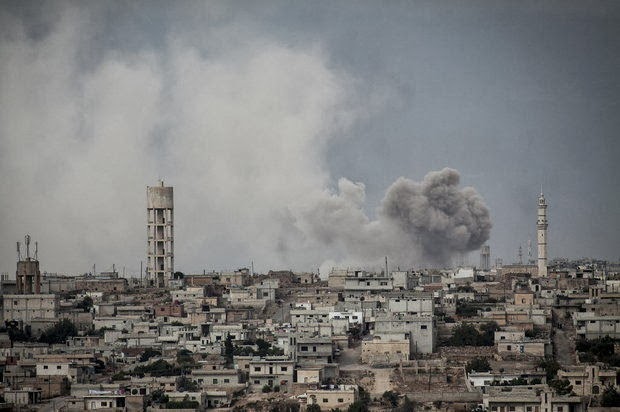Laura
Inhumanity and the moral limit in Syria
By
February 01, 2014
At the
start of the “Arab Spring”, I was so optimistic about the prospect of democracy
in the Middle East and heartened by the uprisings in Tunisia and Egypt. On my mind was the oppression of millions of
Syrians by the brutal Bashar Assad regime.
Also on my mind was my experience during Lebanon's civil war and the
enormous damage the Syrian regime did there.
For 10 of
Lebanon’s 15-year civil war, my siblings and I outran bombs to reach home from
school, took tests while watching sniper bullets bounce off of the building
next-door, heard and felt that terrifyingly loud sound of exploding bombs,
spent long days and nights in rat-infested shelters; and of course dealt with
the poverty and degradation of being refugees—not to mention the repeated damage
to our family's home and grocery store, navigating off-limits streets and
intersections targeted by snipers and so much more. These horrors probably make anyone who's had a
normal childhood cringe.
But
here's the bad news: What the Assad regime has done to its own people since
March 2011 is far more brutal, destructive and degrading than the enormous
damage it did in Lebanon. I never imagined this was possible, but it turns out
there's no limit to the regime's inhumanity.
Syria's
numbers today are astounding: 130,000 dead (including thousands of children),
more than 575,000 injured, nearly three million refugees outside Syria, nearly
five million refugees displaced inside Syria; 43,000 Syrians detained and
thousands suffering from starvation and lack of shelter. Then there are the
latest revelations of Holocaust-like torture of thousands.
I suspect
these numbers are conservative and don't account for the destruction of entire
villages and cities and the fear, pain and hopelessness millions of Syrians are
enduring every day.
When the
uprising began, I naively thought that once the world community sees the real
Assad regime, something would happen to remove it from power and Syrians would
finally have a dignified life. I thought what kept Western countries from
looking into the atrocities committed by the regime for the past four decades
was the nearly perfected, sophisticated, lying facade of the Assad family and
their apologists. Once the truth was revealed, I was sure things would change.
Fast
forward to January 2014. Thanks to traditional and social media, the world is aware
of the massacres and we continue to see horrifying images of mutilated bodies,
rows of dead children and so much more. My hat is off to saintly aid workers
and journalists, but the rest of us do nothing to stop the madness. Where is
our outrage? Where is our humanity?
Where is the world's conscience? Have we become numb to the images of the
suffering, torture and mutilation?
Forget
the fiasco about red lines and chemical weapons. And, forget the peace talks in
Geneva, which are unlikely to be productive as long as Assad is in power. The
fact of the matter now is clear as day: The world knows Assad's brutality well
and does not care.
I don’t
claim to have the answers to the difficult and complicated geopolitical
considerations, but I know two things must happen: The bloodshed must be
stopped and the criminal regime must be removed and punished.
I
understand the plight of Christian minority inside Syria. And, yes, Iran,
Russia, Israel and the American public make military action difficult. But when
does it all stop? Teams of experts
reviewing the recently released torture archives have made a direct comparison
to the Holocaust. Are we waiting until
the number of dead Syrians reaches six million?
Has the world learned nothing from Holocaust? Shame on every world leader and on every one
of us for not doing more, for not caring more, and for not demanding the end to
this holocaust.
In the
words of the late journalist and author Christopher Hitchens (who was writing
in 2010 about Henry Kissinger's reference to gas chambers on the Nixon tapes),
"There has to be a moral limit, and either this has to be it
or we must cease pretending to ourselves that we observe one."
So, does my beloved country have a moral limit
when it comes to Syria? Does the world?
Boustani
is a Lebanese-American who immigrated to the United States from Lebanon in the
1980s.

